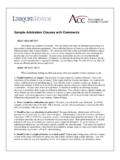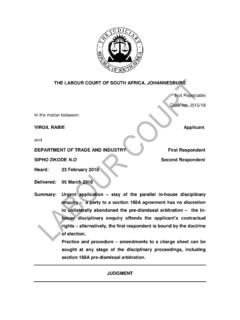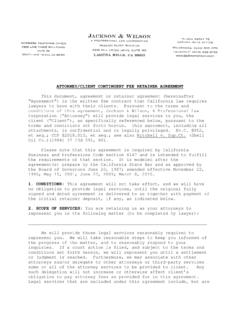Transcription of Notice to Employees Covered by IBEW Union …
1 October, 2014 Notice to Employees Covered by IBEW Union security Agreements: fee payers objection plan for 2015 Many collective bargaining agreements between employers and the IBEW or its local unions include " Union security " provisions stating that Employees must become and remain members of the Union as a condition of employment. The National Labor Relations Act permits employers and unions to negotiate these clauses where they are not otherwise prohibited by state law. These provisions are also permitted under the Railway Labor Act and under many state public employee bargaining laws.
2 Under these laws, Employees may fulfill their " Union security " obligations either by joining the Union and thereby enjoying the full rights and benefits of Union membership, or by simply fulfilling their financial obligations to the Union . Employees who elect to become agency fee payers that is, who choose not to become full-fledged IBEW members forfeit the right to enjoy a number of benefits available only to Union members. For example, only Union members are entitled to attend and participate in Union meetings; to run for Union office and to nominate and vote for candidates for Union office; to participate in contract ratification and strike votes; to participate in the development and formulation of IBEW policies; to participate in the formulation of IBEW collective bargaining demands; and to serve as delegates to the International Convention.
3 Agency fee payers are generally charged the same dues and initiation fees uniformly required of IBEW members. However, agency fee payers who object to supporting certain Union activities may pay a reduced fee to ensure that none of their money is used to support those activities. In particular, objectors are charged only for activities or projects that are reasonably related to collective bargaining. Examples of such "chargeable" activities are negotiating collective bargaining agreements; meeting with employer representatives; meeting with Employees on employment-related issues; participating in proceedings on behalf of workers under the grievance procedure, including arbitration; and managing internal Union affairs.
4 Among activities considered "nonchargeable," which objectors are not required to support, are support of political candidates, general community service, legislative activities, certain costs of affiliation with non-IBEW organizations, and members-only benefits. The IBEW Agency fee payers objection plan establishes the procedure for obtaining a fee reduction and is set forth in full below. By way of summary, fee payers must file their objections during the designated open period (usually the month of November) or within 30 days of becoming agency fee payers. Current fee payers who wish to file objections for calendar year 2015 must do so during the month of November 2014.
5 Objections must be addressed to the International Secretary-Treasurer, IBEW, 900 Seventh Street, , Washington, 20001, and must be postmarked during the November open period. Objections filed during this open period will become effective on January 1, 2015, and will remain effective for as long as the objector remains in the bargaining unit. No special form is required to register an objection . However, please include your full name, your mailing address, the local Union to which you pay fees, your nonmember identification number (if known), and your Social security number. In addition, if you move, please advise the International Secretary-Treasurer of your new address.
6 Dues and fees paid by Employees Covered by IBEW bargaining agreements consist of a portion retained by the local Union and a portion that is transferred to the International. During January of each year, or as soon as possible after receiving a timely mid-year objection , the International will mail a check reflecting the reduction in the International's portion of the fees to each objector who has filed a timely objection with the International Secretary-Treasurer, along with a detailed explanation of the basis for the fee reduction. During these same time frames, the local Union that represents the objector will provide him or her with a reduction in its portion of the fees, either by sending a reduction check or by adjusting the amount of the objector's periodic payments, and will provide information explaining the basis for its reduction.
7 The reductions are based on the percentage of the unions' expenditures that were devoted to "chargeable" and "nonchargeable" activities during the previous fiscal year, as defined above. For example, the International determined that during its 2012-13 fiscal year, of its expenditures were for "chargeable" activities and of its expenditures were for "nonchargeable" activities. The locals' portions vary, with most local unions devoting between 90 and 95 percent of their annual expenditures to "chargeable" activities. In no year has any IBEW local Union spent a smaller percentage of its expenditures on "chargeable" activities than the International, although some of the locals use the International's percentage to calculate their own annual reduction thereby giving objectors a larger reduction than if the locals used their own figures.
8 Some public sector collective bargaining laws require different procedures for honoring the rights of non-members. If you are a public employee Covered by such a law, your local Union will advise you of the proper procedure to follow to register your objection . The IBEW Agency Fee Payers objection Plan1 1. Nonmembers' Right to Object. Any employee who is not a member of the IBEW and who pays agency fees to an IBEW local Union (LU) pursuant to a collectively bargained Union security provision in the United States has the right to object to expenditures of his or her fees for activities that are not reasonably related to collective bargaining.
9 For purposes of this plan , such activities will be referred to as "nonchargeable activities." The agency fees paid by a fee payer who perfects an objection under the procedures set forth below will be reduced to reflect the expenditures of the LU and the IBEW that are used for "chargeable activities" (including, for example, negotiating and enforcing collective bargaining agreements, dealing with employers on employment-related concerns, and Union administration). 2. Procedure for Filing Objections. Each fee payer who wishes to file an objection must do so in writing, addressed to the International Secretary-Treasurer (IST) at the International Office of the IBEW, 900 Seventh Street, , Washington, 20001.
10 In registering their objections, objectors must include their name and address, the LU to which they pay fees, their nonmember identification number, if known, and their Social security number. Objections must be postmarked during the first 30 days after an employee becomes an agency fee payer (either by being hired or transferred into the bargaining unit, or by resigning from Union membership) and becomes obligated to pay agency fees to an IBEW LU under a collective bargaining agreement or, for current bargaining unit members, during the month of November. (The open period may be extended in Convention years.)





